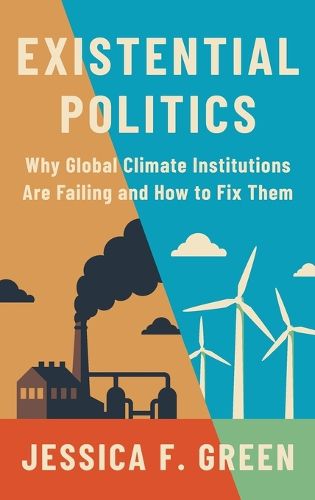Readings Newsletter
Become a Readings Member to make your shopping experience even easier.
Sign in or sign up for free!
You’re not far away from qualifying for FREE standard shipping within Australia
You’ve qualified for FREE standard shipping within Australia
The cart is loading…






A new way to tackle the real politics of climate change through asset revaluation
It's no secret that the Paris Agreement and voluntary efforts to address climate change are failing. Governments have spent three decades crafting international rules to manage the climate crisis yet have made little progress on decarbonization. In Existential Politics, Jessica Green explains why this is unsurprising: governments have misdiagnosed the political problem of climate change, focusing relentlessly on measuring, reporting, and trading emissions. This technical approach of "managing tons" ignores the ways that climate change and climate policy will revalue assets, creating winners and losers. Policies such as net zero, carbon pricing, and offsets all cater to the losers-owners of fossil assets.
Ultimately, Green contends, climate change is a political problem. Climate politics should be understood as existential-creating conflicts that arise when some actors face the prospect of the devaluation or elimination of their assets or competition from the creation of new ones. Fossil asset owners, such as oil and gas companies and electric utilities, stand to lose trillions in the energy transition. Thus, they are fighting to slow decarbonization and preserve the value of their assets. Green asset owners, who will be the basis of the decarbonized economy, are fewer in number and relatively weak politically.
Green proposes using international tax, finance, and trade institutions to create new green asset owners and constrain fossil asset owners, reducing their clout. Domestic investments in green assets, facilitated by global trade rules, can build the political power of green asset owners.
$9.00 standard shipping within Australia
FREE standard shipping within Australia for orders over $100.00
Express & International shipping calculated at checkout
A new way to tackle the real politics of climate change through asset revaluation
It's no secret that the Paris Agreement and voluntary efforts to address climate change are failing. Governments have spent three decades crafting international rules to manage the climate crisis yet have made little progress on decarbonization. In Existential Politics, Jessica Green explains why this is unsurprising: governments have misdiagnosed the political problem of climate change, focusing relentlessly on measuring, reporting, and trading emissions. This technical approach of "managing tons" ignores the ways that climate change and climate policy will revalue assets, creating winners and losers. Policies such as net zero, carbon pricing, and offsets all cater to the losers-owners of fossil assets.
Ultimately, Green contends, climate change is a political problem. Climate politics should be understood as existential-creating conflicts that arise when some actors face the prospect of the devaluation or elimination of their assets or competition from the creation of new ones. Fossil asset owners, such as oil and gas companies and electric utilities, stand to lose trillions in the energy transition. Thus, they are fighting to slow decarbonization and preserve the value of their assets. Green asset owners, who will be the basis of the decarbonized economy, are fewer in number and relatively weak politically.
Green proposes using international tax, finance, and trade institutions to create new green asset owners and constrain fossil asset owners, reducing their clout. Domestic investments in green assets, facilitated by global trade rules, can build the political power of green asset owners.